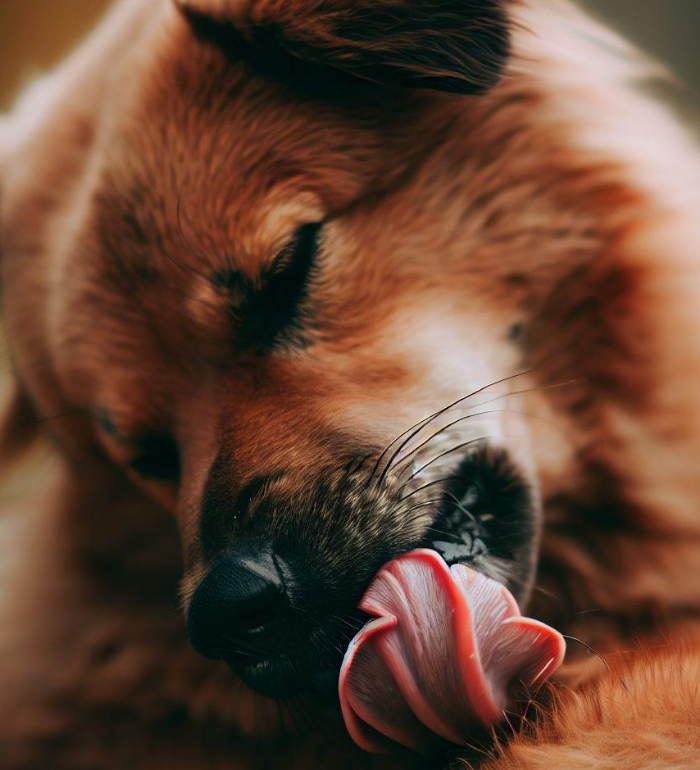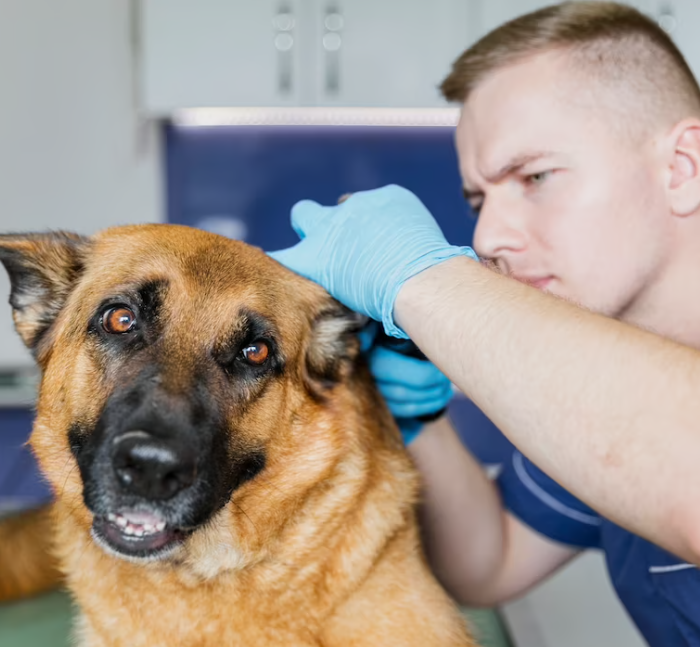2023-11-20
Our paw friends love us unconditionally, accepting us with all our strengths and weaknesses.
We should give them the same in return by caring for them and accepting them even when they exhibit behaviors we do not understand and consider quirky.
Licking their butt is a type of behavior, we do not really enjoy seeing our dogs exhibit, as from a human perspective this is repulsive and not normal. Today, we will take a closer look into this type of behavior and discuss if it is common in dogs and if it may be a cause for concern.

Dogs exhibit a variety of behaviors, for biological, instinctual, and social reasons.
While “licking their butt” may seem an odd behavior, to say the least, it is quite normal for dogs. It serves essential functions related to hygiene, self-soothing, and communication. It is just a part of the regular grooming process, to maintain their coats clean and neat.
Butt licking helps dogs clean areas of their bodies which otherwise are hard to reach. The anal area is such a spot that requires attention, especially after bowel movements.
The specific structure of their tongues makes it easy for canines to effectively groom themselves. Their tongues just like humans’ contain special structures―barbs, known as papillae, which have different functions-they facilitate the sense of taste thanks to the clusters of taste buds and also serve grooming.
A fun fact you may be interested to know is that dogs have less than 2000 taste buds, compared to humans, who have about 9000 taste buds. Also, it is believed that dogs are able to detect water, which is a great advantage to their specie in terms of survival.
Butt licking is a type of behavior that can be tracked down to dogs’ ancestors, especially the female ones, who licked their pups’ butts to keep them clean and stimulate bowel movement. If you have a female dog, who has given birth, you may have noticed the mother licking their pups to help them eliminate waste.
Having said that, butt licking is likely to have remained an evolutionary-based natural type of behavior in dogs.
Dogs are pack animals, whose interaction with counterparts is based on a certain hierarchy. If a dog licks the butt of another dog, this behavior may be perceived as a sign of submission / accepting the other’s animal dominant position.
A well-known fact about dogs is that they sniff each other’s rear ends to detect their specific scents and unique pheromones providing essential information about them. By licking their butts dogs may be spreading unique information about them which helps them mark a territory or facilitates interaction with other canines.

The anal glands are small sacs located on the lower side of the anus. If they get infected, your paw friend may start exhibiting behaviors like excessively licking their butt. Immediate veterinary consultation is advisable in this case.
The skin on certain body areas such as the belly, the private parts, and the anus is very sensitive and can get easily irritated or infected. Redness may occur on the affected area, and your paw friend may start exhibiting behaviors like excessive licking to mitigate their discomfort.
Your paw friend may be allergic to certain food, or sensitive to factors in the environment which can cause gastrointestinal issues and lead to excessive rectal licking. Your veterinarian may advise you to change your dog’s diet, add supplements or remove certain allergens from their surroundings.
Parasites, such as fleas, and ticks can affect the area around the anus and the tail, causing itching and excessive licking. There are also internal parasites like worms whose presence may be indicated by behaviors such as rubbing the bottom on the ground or pieces of furniture at home, scratching, and excessive licking. We highly recommend that you keep track of your dog’s or cat’s parasite control and make sure they are protected.
Perianal fistula (also known as anal furunculosis) is a medical condition that can affect different purebred or mixed breeds and is most common in German Shepherds. This condition is accompanied by chronic, ulcerating, sinus tunnels in the anal area and the surrounding skin. Deviations from the standard behavior of your dog including extreme rectal licking or rubbing their butt, may occur.
If the skin of your dog on certain body areas got cut or burned during a grooming session, they may start excessively licking that area to soothe it.
The most common signs of rectal tumors in dogs are blood in the stool, straining to relieve themselves, and/or painful bowel movements. Additional symptoms that usually accompany serious health conditions like rectal tumors are loss of appetite, fatigue, decreased energy, and licking or biting the anal area.

As explained above, occasional licking of the rectal area is a normal behavior in dogs. If it becomes excessive and does not seem to fade out within a day or two, you should consult with a veterinarian. They will examine your dog, including their stool if needed, and may also run blood tests to receive information on the function of their organs and immune system.
Blood tests will help identify the presence (or absence) of underlying health conditions and prescribe proper treatment. It is essential for us as responsible owners to be able to determine when our beloved dogs and cats exhibit natural behaviors and when there might be a cause for concern. While the reason for certain unusual behaviors may be harmless, risks should not be taken when it comes to the health of our paw friends.
That is why regular veterinary check-ups, a balanced diet, and a clean environment are recommended as they can contribute to our furry friends' overall health and happiness. Understanding the reasons behind the behaviors our pets show can help us develop a deeper bond with them and ensure their well-being. We should embrace their quirkiness, and cherish the special bond we share with them!